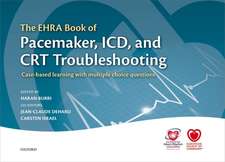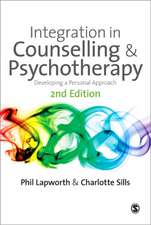Biological Psychology: Critical Thinking in Psychology Series
Autor Minna Lyons, Neil Harrison, Gayle Brewer, Sarita Robinson, Robert L. Sandersen Limba Engleză Paperback – 20 mar 2014
Learning features including case studies, review questions and assignments are provided to aid students' understanding and promote a critical approach. Extended critical thinking and skill-builder activities develop the reader's higher-level academic skills.
Preț: 308.11 lei
Preț vechi: 324.32 lei
-5% Nou
Puncte Express: 462
Preț estimativ în valută:
58.96€ • 61.33$ • 48.68£
58.96€ • 61.33$ • 48.68£
Carte tipărită la comandă
Livrare economică 15-29 aprilie
Preluare comenzi: 021 569.72.76
Specificații
ISBN-13: 9780857256935
ISBN-10: 0857256939
Pagini: 240
Ilustrații: 40 illustrations
Dimensiuni: 170 x 242 x 13 mm
Greutate: 0.39 kg
Ediția:1
Editura: SAGE Publications
Colecția Learning Matters
Seria Critical Thinking in Psychology Series
Locul publicării:London, United Kingdom
ISBN-10: 0857256939
Pagini: 240
Ilustrații: 40 illustrations
Dimensiuni: 170 x 242 x 13 mm
Greutate: 0.39 kg
Ediția:1
Editura: SAGE Publications
Colecția Learning Matters
Seria Critical Thinking in Psychology Series
Locul publicării:London, United Kingdom
Cuprins
Chapter 1: Introduction to biological psychology
Chapter 2: The brain
Chapter 3: The nervous system
Chapter 4: Sensation and perception
Chapter 5: Emotions
Chapter 6: Memory
Chapter 7: Motivation
Chapter 8: Language
Chapter 9: Consciousness
Chapter 10: Stress and health
Chapter 2: The brain
Chapter 3: The nervous system
Chapter 4: Sensation and perception
Chapter 5: Emotions
Chapter 6: Memory
Chapter 7: Motivation
Chapter 8: Language
Chapter 9: Consciousness
Chapter 10: Stress and health
Notă biografică
Minna Lyons is Senior Lecturer in Psychology at Liverpool Hope University.
Descriere
This text addresses the core knowledge domain of biological psychology, with focused coverage of the central concepts, research and debates in the area. It outlines the importance and purpose of the biological approach and contextualizes it with other perspectives in psychology, emphasizing the interaction between biology and the environment.


















